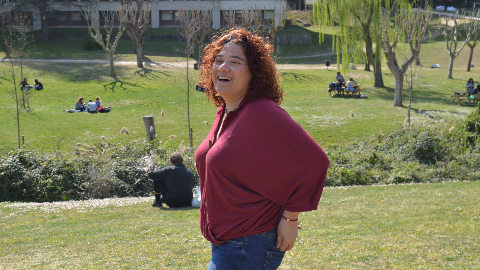Helena Sandín: "There were no women’s rugby models when I started playing because they didn’t exist as such"

02/04/2019
The former player attended a talk about women in rugby in UAB on 11 March. This talk was part of the activities prepared for 8 March and was organized by Centaures, UAB’s rugby team. Txell Turbe, ex-Centaures player and current player in Club de Rugby Sant Cugat (CRSC) and Gis Ferro, current Centaures player also took part in the talk.
Sandín started to play rugby with the team Club de Rugby Bonanova, currently known as Club Esportiu Universitari (CEU) de Barcelona when she was 16 years old, in a moment in which very few people would speak about it, let alone women’s sports: “When I started playing, between 1985-1986, there were no women’s rugby models because they didn’t exist as such. My main model was my coach, Jordi Villalante, and the captain back in the day, Otilia Grosche”.
Women playing rugby was frowned upon back in the day. In fact, the former player confessed that she had to forge her parents’ signature to register in the club because they wouldn’t be in favor of her practicing this sport: “My dad didn’t like me practicing rugby and still doesn’t. He thinks it is not a women’s sport”.
On this matter, Sandín thinks she was lucky with the person who managed the club because he was “very committed in the world of rugby and treated us all equally”, and also with his coach because “when he watched us play, he would only see rugby”.
“Women were an added value in my club. We became good in a very short period of time; we were very organized and self-sufficient”, she pointed out.
In six years they created a team from scratch, won the Catalan League twice and opted to compete in national competitions. They would be an equivalent to a División de Honor. “We were the best of all clubs in Catalonia”, she affirmed.
Sandín explained that she only noticed discriminations and sexist behaviors a posteriori: “I realized what was going on over the years. We went to championships throughout Spain and women always played in the worst places, with the worst clothing and, above all, in the worst timing”.
One of the most important matches that Sandín played and which she will forever remember was against New Zealand’s national team All Blacks: “They were far from our level, but it was a great experience”.
The ex player also remembers the tour through England. She was amazed at how playing rugby as a woman could be “so easy,” because “this sport was already visibilized and it had female school and traditions”.
Sandín played rugby for twelve years, until she had to quit due to an injury in the right knee. She was already working as a nurse in that moment. She married her partner Jaume Capell, former rugby player in Futbol Club Barcelona (FCB) and current president in Senior Association Rugby Barça, with whom she had two children, Oriol and Alba, who inherited their passion for rugby.
Both Sandín and Capell disappeared from the rugby world for ten years, but their children decided to play and they supported them: “My son is now 17 years old and plays in FCB, although he had to stop due to an elbow injury, and Alba, who is now 15 years old, is working to continue in the Catalan league and get to the Spanish one. Passion never ends in this sport”.
Now, thirty years after Bonanova was created and despite the still existing ignorance towards this sport, the ex-player sees how women’s rugby is more visible now and there are female models: “Girls don’t want to be like Jonah Lomu but like Kendra Cocksedge. My daughter already told me that she wants to be like María Casado or María Ribera”.
Sandín also thinks that women’s rugby conditions have improved and its possibilities have multiplied: “Women now have the Catalan team –which already existed-, the Spanish one, there are campus for teams, workshops, specialists are more trained, clubs are better prepared and there are even gym centres when I never imagined I could go prepare myself in one”.
Despite the conditions’ improvement, now more than ever, the ex-player realizes the inequalities between men’s and women’s rugby: “It was only when I wanted to get inside this world again to try to develop it and make it more visible that I got to see that sexism does really exist”.
As a coordinator of the Rugby Barça, Sandín tries to normalize practice of women’s rugby by giving spaces to players and her teammates (clinics, meetings for young players), using Instagram to spread news about their own matches and by encouraging them to attend other matches in order to give support to other players.
“I didn’t realize until now but, when I started, I also had someone looking after me. I hope I can collaborate for this sport to win more display and to keep up with its rise”, she concluded.